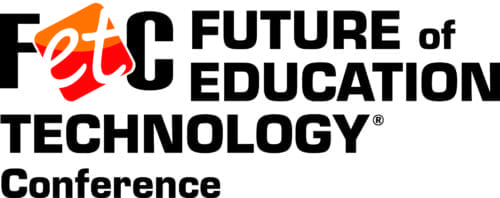 Throughout Monday morning, the 2019 Future of Education Technology Conference (FETC) hosted a series of special events open to all attendees. At these events, educators and vendors had the opportunity to share their experiences with the latest edtech innovations, and those that will shape the future of education.
Throughout Monday morning, the 2019 Future of Education Technology Conference (FETC) hosted a series of special events open to all attendees. At these events, educators and vendors had the opportunity to share their experiences with the latest edtech innovations, and those that will shape the future of education.
Early Learning Digital Sandbox
Walking into the room, building blocks were scattered across the desks and small wooden robots moved about the floor. 10 vendors were present to share their own unique coding product designed for classes ranging from preK-5. Major themes throughout each of the programs included a focus on screen free coding for grades preK-2, the incorporation of storytelling and design thinking, and opportunities to integrate music education into coding resources.
For example, one product offered a “robotics readers theatre” styled program for students and teachers. The program combines computer science with storytelling to engage the students in coding literacy, where students are instructed to read a book and use the wooden coding blocks to put together a line of code that instructs the robot to mimic the storylines found throughout the book. Another program used lego-like building blocks to allow students to create an unlimited variety of robots using their own imagination or following a set curriculum offered by the program.
Computer Science Firehouse
This series of sessions featured a diverse group of educators and vendors sharing the current landscape of computer science, the intersection of gamification and coding, and strategies to help school leaders embrace technology. Two of the featured sessions are outlined below:
The first presenter shared her background as a K-8 special education and art teacher who stumbled into coding by accident. During this hour-long session, she explained how a fun hour of coding turned into a full-time position at her school. A part of the EdTechTeam, her unique program equips middle school students with the skill set to facilitate coding lessons for the K-5 classes. She continued by sharing the positive outcomes of students taking on the role of the teacher with their peers, highlighting the importance of developing an organic network of enthusiastic STEM learners.
In the next room, a presenter shared three tips for closing the gender gap and increasing women’s access to computer science programs. Focused on developing responsible strategies for engaging women in computer science, she encouraged educators to ensure that physical space is gender neutral, helped the audience break common misconceptions about “women in tech,” and shared the importance of role models for young women in these fields. Participants also heard from a recent college graduate about her background in STEM and how mentors helped influence her college academics and career, saying “encouraging students to interact with a network of women in coding helps break stereotypes and encourages women of all backgrounds to pursue computer science.“
Additional sessions focused on bringing physical computing into any classroom, introducing computer science and block-based programming, and how school leaders can embrace IT by creating an all-encompassing tech school that goes beyond the classroom.
FETC Mobile Megashare
The room hosted 12 vendors focused on providing solutions to help empower educators to engage students in more creative mobile learning. Attendees moved throughout the room, participating in roundtable discussions with the vendors and each other to discover new mobile learning strategies and engage in hands-on activities. For example, one table offered a creative robotics station, providing a variety of crafting materials – from colorful straws, pipe cleaners, and googly eyes – coupled with electrical wires and circuits to create their own robot that is connected to their phones via an app to control movements. At another table, a group of educators were engaged in discussions to share insights and best practices about technology planning for district leaders. While many of the vendors incorporated some form of game-based learning, others featured 3D printing, robotics, and audio and video recording.
Further Reading
- edCircuit – FETC 2019: Making the Right Decisions Around Data System and Technology Tools
- Getting Smart – 26 Can’t-Miss Education Conferences for 2019
- The Ed Tech Round Up – Creating An Effective EdTech Ecosystem & Making the Best Use of Tech Tools




